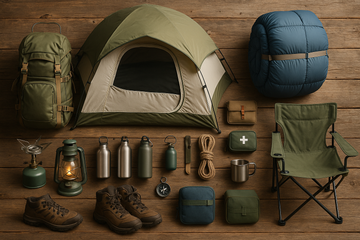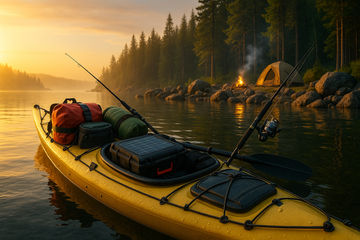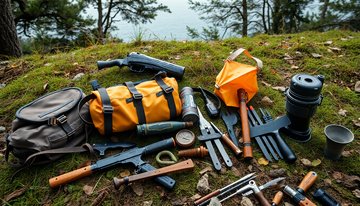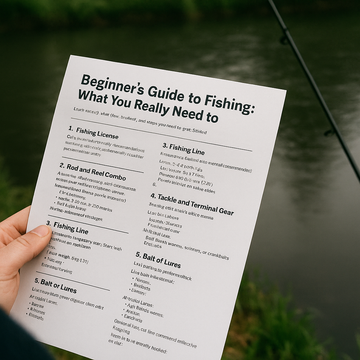Introduction
As we navigate through 2025, the unpredictability of global events continues to rise, making it imperative for individuals to equip themselves with essential survivalist skills. Whether it's due to natural disasters, economic crises, or social unrest, having the tools and knowledge to thrive in adverse situations can significantly impact your well-being. This comprehensive guide will cover essential techniques and skills that every survivalist should master to ensure they are prepared for any challenges that may come their way.
1. Basic Survival Skills
Understanding the fundamentals of survival is crucial. Here are key skills to focus on:
-
Fire Making: Fire serves multiple purposes in survival scenarios. It provides warmth, cooks food, purifies water, and can act as a signal for help. Master various fire-starting techniques, including:
- Using matches and lighters
- Friction methods, such as the bow drill and hand drill
- Flint and steel
- Using natural tinder, kindling, and fuel sources
-
Water Procurement: Water is essential for survival. Knowing how to find and purify it can save your life. Techniques include:
- Identifying water sources like streams, rivers, and lakes
- Collecting rainwater and using tarps or containers
- Creating solar stills to extract moisture from the ground
- Using purification methods like boiling, filtration, and chemical treatments
-
Food Foraging: Familiarize yourself with the local flora and fauna. Key skills include:
- Identifying edible plants, berries, nuts, and mushrooms
- Recognizing poisonous plants and avoiding them
- Learning about local wildlife and foraging techniques
- Understanding fishing and trapping methods to catch food
2. Navigation Skills
In unfamiliar territory, navigation skills are vital. Here are techniques to master:
-
Map Reading: Topographic maps provide valuable information about the terrain. Learn how to:
- Interpret map symbols and contours
- Measure distances using scale
- Determine elevation changes and landscape features
-
Land Navigation: Use natural markers and celestial navigation to orient yourself. Techniques include:
- Using the sun's position during the day
- Identifying stars for night navigation
- Recognizing natural landmarks and terrain features
3. Shelter Building
Creating a shelter protects you from the elements and provides a safe space. Consider these techniques:
-
Natural Materials: Use materials found in your environment to construct a shelter. Key points include:
- Building a debris hut using branches and leaves
- Constructing a lean-to with a sturdy frame
- Using rocks and mud for insulation and stability
-
Emergency Tents: Carrying a lightweight emergency tent or tarp is crucial. Learn how to:
- Quickly set up a tarp for shelter from rain or sun
- Use rope and stakes to secure your shelter
4. First Aid and Medical Skills
Injuries can occur in survival situations, making first aid knowledge crucial. Focus on these areas:
-
CPR and Basic Life Support: Knowing how to perform CPR can save lives. Ensure you understand:
- How to assess breathing and circulation
- Proper techniques for chest compressions and rescue breaths
-
Wound Care: Learn to clean and dress wounds properly to prevent infections. Key steps include:
- Using clean water or saline to clean the wound
- Applying antiseptic ointments
- Using bandages or dressings effectively
-
Recognizing Medical Emergencies: Be capable of identifying symptoms of:
- Shock
- Dehydration
- Hypothermia and heat exhaustion
- Severe allergic reactions
5. Self-Defense Techniques
Being prepared for potential threats is an integral part of survivalism. Consider these practices:
-
Situational Awareness: Always be aware of your surroundings and potential dangers. This includes:
- Recognizing suspicious behavior
- Trusting your instincts about safety
- Being aware of escape routes
-
Basic Self-Defense: Equip yourself with fundamental self-defense techniques. Focus on:
- Understanding how to break free from holds
- Learning how to strike effectively
- Practicing de-escalation techniques
6. Community and Networking
In times of crisis, relying on community can enhance your survival chances. Networking can help you:
-
Share Resources: Pooling resources with others can provide access to supplies and skills that may not be available individually. Consider:
- Forming local survival groups
- Participating in community preparedness events
- Learn from Others: Engaging with local survivalist groups can enhance your skills and knowledge through shared experiences. Attend:
- Workshops and training sessions
- Conferences focused on survival skills
7. Mental Resilience and Adaptability
Survival situations can be mentally taxing. Building mental resilience is just as important as physical skills. Focus on:
-
Stress Management: Develop techniques to manage stress and anxiety, such as:
- Meditation and mindfulness practices
- Breathing exercises to calm the mind
- Positive visualization techniques
-
Problem-Solving Skills: Enhance your ability to think critically and adapt to changing situations. Practice:
- Scenario planning and drills
- Improvisation skills in resource-limited situations
-
Building Confidence: Confidence can greatly influence your chances of survival. Engage in activities that push your limits and develop:
- Physical fitness through outdoor activities
- Skill-building through hands-on training
8. Sustainable Living Practices
Incorporating sustainable practices into your lifestyle can enhance your resilience. Consider these practices:
-
Gardening and Food Preservation: Growing your own food can decrease dependence on external sources. Focus on:
- Understanding permaculture principles
- Learning about seasonal planting
- Methods of preserving food through canning, drying, and fermentation
-
Renewable Resources: Explore renewable energy sources to reduce reliance on conventional power. This could include:
- Solar panels for electricity
- Wind turbines for energy generation
-
Water Conservation: Implementing water-saving techniques can ensure you have access to this crucial resource. Techniques include:
- Rainwater harvesting systems
- Greywater recycling
- Efficient irrigation practices
Conclusion
Survivalist skills are not reserved for extreme situations; they can enhance your everyday life by fostering resilience and self-sufficiency. By mastering these essential techniques, you can ensure that you are prepared for whatever challenges 2025 may bring. Remember, being proactive and knowledgeable is the best defense against uncertainty. Start your journey into the world of survivalism today, and empower yourself to thrive in any situation.












